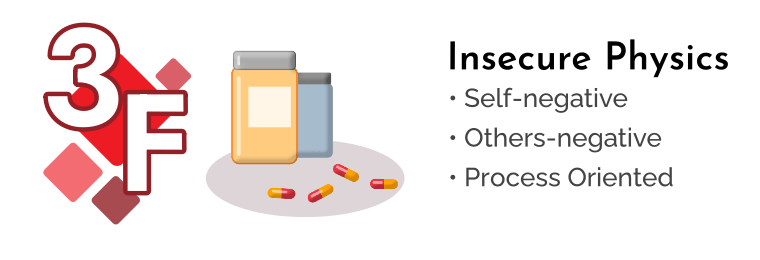
The 3F attitude is characterized by a self-negative (Fs-) and others-negative (Fo-) disposition. This disposition creates an attitude that is plagued by an awareness of limitations, weakness, harm, negative consequences, and manipulation within the realm of physics. This awareness applies internally, externally, and within the exchange of information in the aspect. 3Fs have a keen sense of how they can be harmed by physics. The strategies that each 3F employs to deal with the insecurity may differ in behavior or execution but the core attitude of subjective vulnerability and insecurity will remain consistent for all 3Fs. Below are some common beliefs and behaviors that you may see with 3Fs. Please keep in mind that these are generalities and do not represent the vast sub-archetypes held within the overall 3F attitude.
Dichotomies
Uncertain • Insufficient • Weak • Aggressive • Subjective • Vulnerable • Wordy • Expansive • Universal
Inner Conflict
• Have a distinct confusion and insecurity about their own bodily practical needs.
• Worry about physical flaws which, in turn, can inhibit confidence.
• May miss cues that others are intimately interested in them.
• Become overwhelmed with health concerns and lack of solutions.
• Are extremely sensitive to public opinion on style, makeup, aesthetics, fashion, and how the body operates.
• Require a lot of feedback in order to make sure they are taking care of themselves properly.
• Often feel a nagging sense of urgency to improve their living space.
• Can be sensitive to filth, dirt, and grime.
• Sometimes convince themselves they are sick, diseased, malnourished or dying regardless if evidence points to the contrary.
Reactive Phase
• Overthink purchases and their practical use.
• Get lost in indulgent moments where caution is thrown to the wind, followed by deep regret.
• Obsessively research side effects of illnesses without ever accepting a conclusion.
• Become loudly perfectionistic, expecting every physical object to have an explanation.
• Resort to jealousy and possessiveness in order to keep control over their environment.
• Heavily distrust advice on practical living and the body.
• Offer up aggressive facts about how others are doing bodily related activities wrong.
• Obsess over how to stay active and keep busy in life, spending hours upon hours in the gym or working out.
Dormant Phase
• May ignore side effects or illnesses due to the anxiety that it can cause.
• Avoid paying attention to the practical matters in their lives, missing out on opportunities to add value and worth to their surroundings.
• Distrust outside opinion of their living space, aesthetic, or anything physical but refusing to acknowledge why they disagree.
• Attempt to stay out of the lime-light, refusing to make themselves center of attention in fear of being judged for how they look or what they are physically capable of.
• Neglect keeping track of their money and finances as it invokes too much stress.
• Act as if nothing bothers them, denying any food or health related anxiety.
Secure Phase
• Become comfortable in their own skin, facing the anxiety rather than running from it.
• Learn the best way to manage their lifestyle through healthy eating and exercise in an equanimous fashion.
• Find their own unique style and preferences and are able to stick to them without fear of being judged.
• Become experts in a certain area of the material world, while being able to teach and instruct others on how it operates.
• May zone in on their ability to manage money and surroundings and feel a sense of calm once they have mastered this endeavor. Can become secure in how their body reacts to all foods and slowly start to reduce anxiety related to it. Become curious of the body and how it works despite any negative feelings that may crop up.